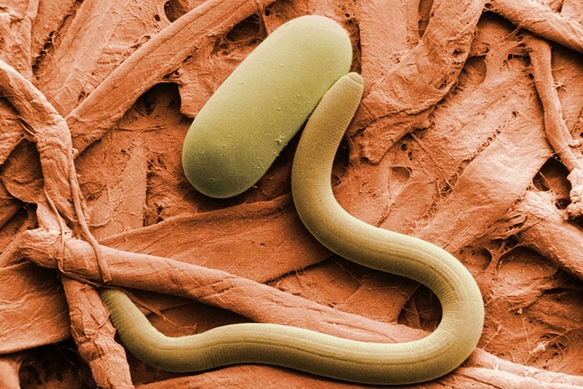Gut microbes can fight parasites: Probiotics may reduce infections, and severity of infections, in developing countries
06/05/2018 / By Frances Bloomfield

Your ability to fight off parasitic worms may be aided by your gut microbiota. This was the conclusion that researchers from Washington University in St. Louis reached in their study, published in Microbiome.
Studying the guts of people from Liberia and Indonesia revealed that their gut microbiomes were remarkably similar, regardless of the distance between the two nations. For their study, the researchers collected a total of 402 fecal samples from 250 individuals in villages across both countries. The samples were then subjected to tests to identify which ones contained parasites. Following this, all samples were analyzed for the microbiomes.
The researchers were able to pinpoint 12 microbial strains from the guts of infected participants, with the most notable being Olsenella. Typically, this bacterium is most known for causing endodontic infections or infections of the dental pulp. Given as a probiotic, however, Olsenella has been shown to lessen gut inflammation as well.
Among those who were free of parasitic worms, the researchers uncovered the presence of Lachnospiraceae in high numbers. A common mammal gut bacteria, Lachnospiraceae is of interest to researchers due to its ability to produce butyric acid, which in turn has the potential to decrease the risk of colon cancer. This bacterium is linked to inflammation as well.
Given these findings, the researchers stated the lower incidence of parasites in certain individuals might be due to inflammation. Speaking to WAMU.org, study author Makedonka Mitreva explained: “When the body is infected with worms, it tries to do worm expulsion with an inflammatory reaction. Worms have to fight back to remain in the gut; that’s why worms are known to secrete anti-inflammatory molecules to reduce inflammation.
100% organic essential oil sets now available for your home and personal care, including Rosemary, Oregano, Eucalyptus, Tea Tree, Clary Sage and more, all 100% organic and laboratory tested for safety. A multitude of uses, from stress reduction to topical first aid. See the complete listing here, and help support this news site.
“Our interpretation is that parasites need a healthy environment for long-term survival. Good bacteria may facilitate parasitic survival, so a bacterium like Olsenella that decreases gut inflammation is helpful.” (Related: The silent killer: Modern lifestyle promotes Leaky Gut and low-level chronic inflammation.)
In a separate statement to NutraIngredients.com, Mitreva remarked that this might hold hope for individuals living in areas where parasitic infections are commonplace – particularly since there has been growing evidence showing that these parasitic worms are developing a resistance to conventional drug treatments. “The big problem is reinfection. Even if the therapy works and the infection is cleared, the exposure to contaminated soil is so pervasive that new infections are extremely common,” she said.
Thus, the solution may lie in altering gut microbiomes instead of attempting to directly kill the parasites. “Ideally, we would like to be in a position to suggest some local fermented foods that could alter the microbiome and result in a decreased rate of reinfection,” she said. “Rather than give more antihelminthic drugs, we want to help people fight off the infection by themselves.”
How can fermented foods help?
The fermentation process encourages the growth of what many researchers call “friendly” bacteria. They’re known as such because once eaten, these bacteria can help replenish the gut microbiome and even diversify it further. Another advantage of fermented foods is that they come somewhat predigested (courtesy of bacteria feeding on the natural sugars). This makes it so that they’re easier to digest, as well as healthier since the body can absorb the nutrients better.
Fermented foods are available in many shapes and forms, with some of the well-known and common ones being:
- Yogurt: The rich probiotic content of yogurt makes it one of the best-fermented foods around. Plain, unflavored, and unpasteurized yogurt is ideal, though dairy-free yogurts will suffice. Avoid yogurt that has added fruits or sugars for optimal health.
- Sauerkraut: On top of its impressive probiotic content, sauerkraut is also loaded with numerous other nutrients. It contains dietary fiber, calcium, iron, and vitamins A, C, and K.
- Kimchi: Those who can handle spice should give kimchi a try. Just like sauerkraut, kimchi is traditionally made from fermented cabbage, though there are some varieties made from other health-promoting vegetables like radish or cucumber.
Find out what other fermented foods are good for your gut by visiting Nutrients.news today.
Sources include:
Tagged Under: fermented foods, functional food, good bacteria, gut bacteria, gut health, gut microbiome, Health and Wellness, healthy gut, Lachnospiraceae, Microbes, microbiome, nutrition, Olsenella, parasitic infection, probiotics




















